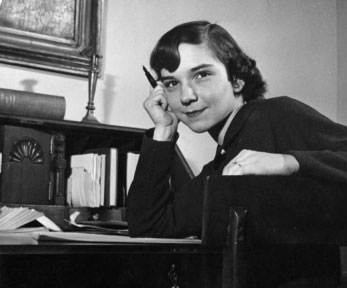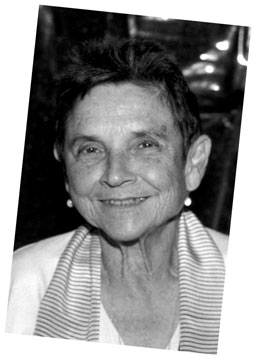|
A bouquet to Adrienne Rich:
A celebrated powerhouse of the 20th century
By Rushda RAFEEK
Many appreciations with a tear of love for the late American poet and
theorist Adrienne Rich dead at 82 on March 28, the cause being
rheumatoid arthritis, seemed to have appeared everywhere and wherever it
must be, even better early as this later written. Even still, having
devoured all of it I am left hollow- aware that there is a shock to be
nursed. And so this became a bouquet of gratitude- “to do something very
common, in my own way”.
When I was 17 years old, I remember not very long ago, idly flipping
through my A-Levels poetry anthology at class after semester exams or so
and no sooner eagerly reading “Amends” by Rich, over and over again.
 |
|
Adrienne Rich |
Her emphasis that all receive equally, her fist rising high for
feminism movement and gay/ lesbian rights, the search for tenderness,
her husband who wove the trigger to his head for her to live as she
desires, that stain on her apron she felt against the domestic life of
an American housewife in the 60s and declining the national Medal of
Arts in 1997 was then a distanced meadow yet unheard of, unseen.
Poem
Knowing her was not really necessary, for the poem remained out of my
syllabus at the time lamentably. Had it been included, what many were
there to fathom, breathe the air that was colouring the oppressed
canvas, accept and eat as Rich said, poetry, is good enough to eat. With
that sewn to a streak of regret, I pulled back my anthology again to
page 148 where it sits- full and fierce beginning with “Nights like
this”. Little of the woman did I know then in ways more than one.
Thirsty from the house of memory- lighting candles accidentaly, today I
welcome nights like this which I haven’t forgotten.
To grow in part with her epigrammatic poetry that conformed to her
father’s anticipating standards, one often gathers that not only did
Rich live her poems but also led each of them into impacted metaphysical
poetic and political craft all the more shifting its command of language
progressively, mixing itself with a smattering of rage awash in noise of
the head.
With utter temerity, her contribution as a feminist poet also a
political one it is clear, that her life with its confrontational
attitude raked out the truth hidden under the world of the vicious by
recognising sensical in its sensibility in poems like: “What Kind of
Times Are These”, “Power”, “Diving into The Wreck”, and “Prospective
Immigrants Please Note” or poems that have wrenched the domestic issues
undergone at motherhood and being a wife, or a conflation unity of both
in “Trying to Talk with a Man,” or sometimes the darkishly sinister
“Lucifer in the Train”.
Response
Most importantly “The Burning of The Paper Instead of Children” which
argues in response to the Vietnamese War concurrently beefing up its
theme with social injustice and inequality of women being excluded from
literal society dominated by the male canon more generally in “an age of
long silence”. Matter of fact and yet contemplative, the interplay of
her nimble discourse stands unafraid outstandingly:
knowledge of the oppressor
this is the oppressor’s language
yet I need it to talk to you
Her unyielding struggle to generate a certain sense of the shameful
cultural treatment of imposition rises immediately out of what she is
consciously looking at. But so then is the twist, socially conscious
critical intellect that rolls in dropping into mere sentimentality or
even, from largely a personal sadness encountered. Further
intentionally, she began pointing out through coercive expression in
“Twenty One Love Poems”:
Your silence today is a pond where drowned things live
I want to see raised dripping and brought into the sun
Even the silt and pebbles of the bottom
deserve their glint of recognition. I fear this silence
Research
Rich’s overt research by recognising a stasis range of view, for
valuing the gender that has been stifled and pushed at the bottom than
just standardising a plain view upon them is laudable in itself. A step
taken by me is a step given for all women, this we find in her ‘Richian’
advocacy with an inner steeliness and a touch of poignancy which we
reach tersely as she singled out. Having published 24 volumes of poetry
couched along awards of the highest class and slices of non-fiction
prose, Rich with her presence quizzically textured explored the war
bitten, patriarchal humanity not for the silence but for the sadness in
respect it could reveal “for the sake of poetry at least/ I need to know
these things.”
Further, the unforgotten ‘Eve’ posited in her perspective, as you
also come across in an immense collection of her essays paddle in the
themes of socio- political and controversially personal writing
permeating a wakeful revelation where she questions “how and why women's
choice of women as passionate comrades, life partners, co-workers,
lovers, community, has been crushed, invalidated, forced into hiding.”
To express and inform in an overt manner without apprehension, her
feelings turned to be in a lesbian relationship becomes a way of
escaping the “silence” and “limits” in its impulse and “wick of desire”
even leaning onto an essential part Rich maintained: “we must use what
we have to invent what we desire.”
 |
|
Adrienne Rich |
In sonnet sequence, “Twenty One Love poems” also thematically avers
the empathy of celebration for woman to woman love convincing that she
could even soften the sharply cutting tones if she could and when she
does, it is luscious like the unfolding of a rose bud or the girl with
the “tulip red” umbrella as Sylvia Plath described in her journal on
meeting Rich.
Such lines in “The Floating Poem, Unnumbered” that leave an elusive
echo are irresistibly unavoidable of the female experience:
“your strong tongue and slender fingers
reaching where I have been waiting years for you
in my rose-wet cave- whatever happens, this is.”
Later, in her volume Dark Fields of the Republic: Poems (1991-1995) a
memorable one, throughout the poem “In Those Years”, highly polished and
salted, enfolds by scarifying the plunge into chief concerns of lucid
matters of the isolated conscience that is linked to the larger world
through our doing; the self quarrelling tension it creates and “of the
meaning of we, of you/ we found ourselves/reduced to I/ and the whole
thing became/silly, ironic, terrible” which ultimately has ensconced as
my medicinal touchstone having moved me- by throwing in a new gist of
identification of oneself where they belong and how its catastrophic,
helpless impact will take heed of their “personal weather”; the
acquiescing life of a human stuck in a community that takes them for
granted.
Unlike many lesbian figures, Rich lived a life atypical. Being a
mother of three and a wife for one, she also admitted it was the one
able way she culled so to tear from her ‘first family’.
Rich later moved to California with Michelle Cliff, struggling still
intensely for what she believed were ill valued principles in the
American history, nevertheless certain it must change and it actually
turns the poet into her poems as it were in eventual terms, “where
poetry is liberative language, connecting the fragments within us,
connecting us to others like and unlike ourselves, replenishing our
desire.”
Configuration
In a way, the ability to use a language of strength and configuration
that bites into the glass and finding oneself in situations in which
they could recognise not just themselves but, with that, the discordance
between what they were and what through their rhetoric of freedom and
realising themselves in their own right including the empathy she, with
and for others felt by personal pain, and some kind of symbol “plucked
and fingered by women outside the law” that communicates with the
silence without falling into it, by raising a ripple in the water, the
tear in the kiss, the utter in the stutter -
I recognise that Rich’s leftist lessons are not merely for citing as
a profound example of feminism and what she strove defensively to wrest
her due place within it, or for school memory’s sake, but a bridge of
spine to truths running parallel, transcending, otherwise beyond most
that fear building.
|

